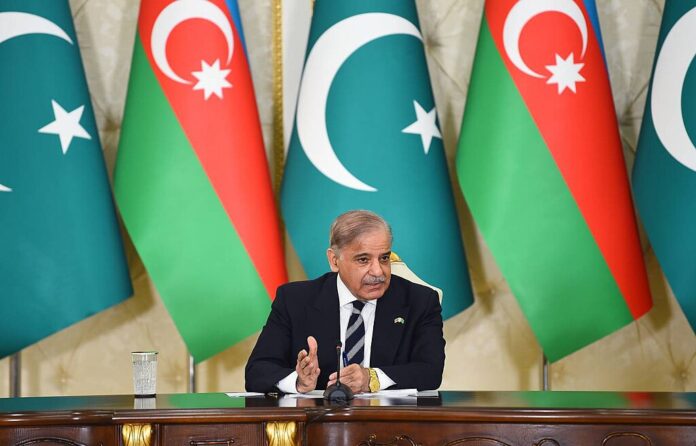The IMF will consider Pakistan’s $7 billion bailout agreement on September 25, with Prime Minister Shehbaz Sharif applauding the support from friendly nations that helped secure the deal
Prime Minister Shehbaz Sharif has lauded the support of international allies as Pakistan’s new 37-month Extended Fund Facility (EFF) reaches a critical milestone. The International Monetary Fund (IMF) has scheduled a board meeting on September 25 to discuss and potentially approve the $7 billion bailout agreement that Islamabad negotiated in July.
The EFF is a crucial component of Pakistan’s strategy to stabilize its economy. The IMF’s approval is contingent upon Pakistan securing $2 billion in external financing from bilateral and commercial lenders, a requirement the country has met. This financing includes substantial deposits from Saudi Arabia, China, and the UAE, as well as $4.5 billion in commercial loans.
IMF spokesperson Julie Kozack confirmed that the board meeting will review the bailout agreement, following Pakistan’s successful acquisition of necessary financing assurances from its development partners. She emphasized that the EFF is designed to build on the achievements of the 2023 nine-month standby arrangement, which set a foundation for economic stability.
Embed from Getty ImagesFinance Minister Muhammad Aurangzeb expressed optimism about the upcoming IMF board meeting, highlighting the resolution of outstanding issues with the IMF. Aurangzeb praised the efforts of Prime Minister Sharif’s team, the IMF negotiators, and the institutions involved. He pointed out that the country’s economic trajectory is improving, with a notable reduction in inflation and an increase in investment and business activities due to the recent cut in the monetary policy rate.
State Bank of Pakistan (SBP) Governor Jameel Ahmad also reported that Pakistan has successfully arranged over $2 billion in external financing, which he described as the “final hurdle” for the IMF loan program. Ahmad was confident that no further obstacles would impede the board’s approval of the bailout.
In addition to securing the IMF agreement, Pakistan has taken significant economic steps, including a record 40% increase in tax revenue and adjustments in energy prices to meet IMF demands. These measures have contributed to a recent upgrade in Pakistan’s credit rating by Moody’s and Fitch Ratings.
Prime Minister Shehbaz Sharif, addressing the federal cabinet, praised the support from friendly nations, which he said was instrumental in advancing Pakistan’s economic interests. He expressed hope that the IMF package would be the last of its kind, emphasizing the need for Pakistan to achieve economic self-sufficiency. Sharif also highlighted the recent policy rate cut by the SBP, which he believes will foster investor confidence and economic growth.
Sharif acknowledged the historical assistance from allied countries but cautioned that repeated requests for financial aid might diminish Pakistan’s global standing. He expressed regret that, despite being a nuclear power, Pakistan continues to rely on external support.
Analysis
Political: The IMF bailout agreement represents a significant political achievement for Prime Minister Shehbaz Sharif’s government. Securing the $7 billion package amidst economic challenges demonstrates the administration’s ability to navigate complex international negotiations. The political implications are considerable, as successful approval by the IMF could enhance Sharif’s standing domestically and internationally. However, the reliance on foreign aid may also expose the government to criticism regarding its economic management and dependency on external support.
Social: The EFF agreement has broad social implications for Pakistan. The anticipated economic stability could lead to increased investment, job creation, and improved public services, benefiting the general populace. The reduction in inflation and interest rates is expected to provide relief to ordinary citizens, whose purchasing power has been eroded by economic instability. However, the social impact of continued external dependence and austerity measures could create tensions if economic reforms lead to increased living costs or reduced public spending.
Racial: The IMF bailout and subsequent economic policies do not directly address racial issues but can have indirect effects on different socio-economic groups within Pakistan. Ensuring equitable distribution of the benefits from the IMF package will be crucial to prevent exacerbating existing inequalities. The government’s ability to balance economic reforms with social inclusion will be important for maintaining social cohesion.
Gender: The IMF bailout’s impact on gender dynamics in Pakistan is likely to be indirect. Economic stability could potentially lead to more opportunities for women in the workforce if investment increases and businesses expand. However, the success of these outcomes will depend on the implementation of gender-inclusive policies and programs that ensure women benefit equally from economic growth.
Economic: Economically, the IMF bailout is a critical lifeline for Pakistan, providing necessary funds to stabilize the economy and support growth. The agreement comes at a time when Pakistan faces significant financial challenges, including high debt levels and a need for structural reforms. The reduction in policy rates and increased tax revenues are steps toward economic stabilization, but the long-term success of the program will depend on effective implementation and the country’s ability to reduce reliance on external financial support.
